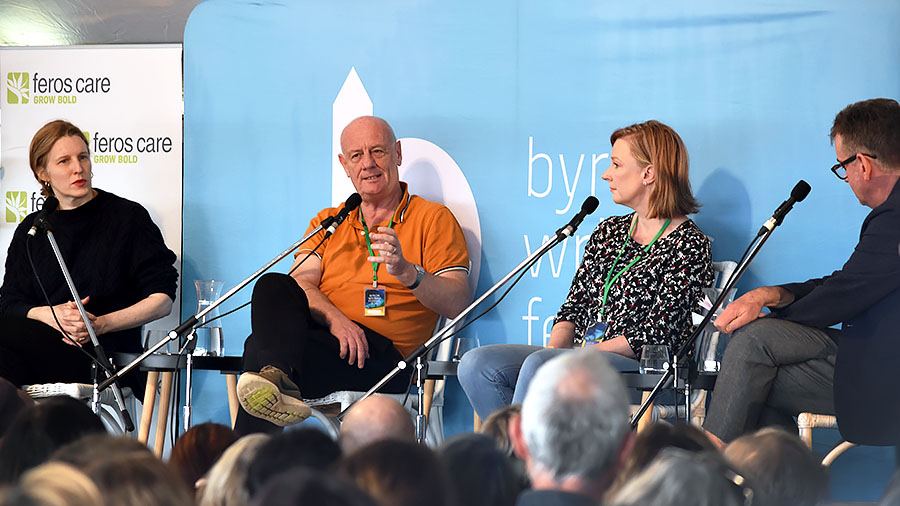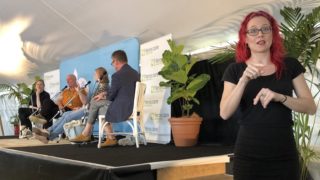Resilience and strength during adversity

When you think back over the last 20 years, which disasters – natural and man-made – come to mind for you?
The September 11 terror attacks. The Boxing Day and Japanese tsunamis. The Victoria Black Saturday fires. There are dozens more.
Our climate, our world is quite adept at presenting the nearly 7.7 billion of us with instances of significant adversity.
It is likely these will increase in frequency as our global population grows.
But no matter how much we accept this, the chances are that ‘when disaster strikes, it happens on a day out of the blue’.
This quote is how the ABC’s Big Ideas presenter and session chair, Paul Barclay opened this incredibly popular and packed Saturday session on resilience and adversity at Byron Writers Festival.
The panel are highly qualified to speak about these issues and how to develop or hold onto resilience and strength in the face of adversity.
In 2004, Tim Costello was CEO of charity World Vision when the Boxing Day tsunami hit. His impassioned personal calls to Australians led to over $100 million donated to tsunami aid through the charity.
Facing the immediate aftermath of the tsunami may have ‘destroyed [his] naivety’ but not his optimism.
Despite having his faith as a resource from which strength, he still felt small and overwhelmed, and found himself asking ‘what difference can I make’ against the scope of such a disaster?
A response, that was repeated by each panelist, was ‘be a presence’, to let people know they are not alone is reassuring and strengthening.
However, Chloe Hooper, who has written about the 2009 Victorian Black Saturday bushfires in The Arsonist, says what people need in the height of a disaster response are infrastructure, emergency services, Red Cross and aid agencies.
She explains that resilience is no substitute for good policy, sustainable agriculture, good water, and policies that provide employment and opportunities, as it is often in these places already suffering systemic neglect where traumatic disasters happen.
ABC’s 730 presenter, Leigh Sales considers herself an atheist, and yet appreciates that people’s faith in a higher power has gotten them through the toughest moments of their lives.
However she also believes that there are other things that can fortify a person’s resilience including a sense of purpose, working for the greater good, personal resilience and the kindness of people.
She wrote Any Ordinary Day to explore how ordinary people came back from the worst day of their lives.
But what if ‘being present’ makes it worse?
Sales says she was worried about this in writing the book, but if someone has just lost a child for instance, there is not much that can make that worse.
The opposite applies however, where avoiding someone, letting them feel abandoned, would be worse.
She took the position of being there to ‘accompany’ a person through their trauma and grief, to try to pay attention to their needs, and be there for them, from the position of ‘it is not about me, it’s about them.’

Hooper explores how important stories of heartbreak and faith are to humanity, and that ‘literature is full of stories of survival or resilience’.
But do we have an ethical responsibility to the real people in those stories?
Barclay reflects on his own shame of discovering a ‘great story’ opportunity before considering the people suffering trauma, which led Barclay to contemplate his own position on empathy.
In a similar way, Sales says, she doesn’t want to add to the trauma of people she interviews, so she seeks their input in the final product.
This way they can say what they need to say and not feel regretful, but instead relieved.
Costello regrets that people seem to just yell at each other on social media, lacking any compassion or acceptance for others and instead equating a disagreement to being hated or attacked.
His solution is to listen to each other’s stories.
‘There actually aren’t that many people, if you hear their story, that you can’t love.’
Costello adds that if we ‘truly understand’ a person’s position and hear their story, it becomes ‘that much harder to not have empathy’.
Throughout this emotionally charged session empathy, there is a common feeling resonating with everyone present—that it doesn’t just happen to others, it could happen to us.
This is why, Hooper says, ‘I don’t talk to people who don’t want to speak to me, because how would I feel if the tables are turned.’
This understanding helps us to develop empathy and compassion for others who are in the thick of it, experiencing the worst events that nature and humanity can inflict upon us.
Costello is moved to tears when retelling his experiences with disaster aid work and personal grief.
He speaks about his fear for his daughter’s well-being, sharing his wife’s grief, and facing the horrors of the Boxing Day tsunami, and it is clear that he feels keenly just how painful empathy can be.
Hooper says, ‘even a fortunate life has profound sadness’ and that these tragedies are beyond our control.
However, she adds, a writer’s job is to ‘accompany people on their stories of trauma,’ and through the words on the page we can have some control of how the story is told.
Ali Rayner is a Southern Cross University Creative Writing student. Southern Cross University students have reported on Byron Writers Festival since 2010. Find out where a degree from Southern Cross University can take you.
